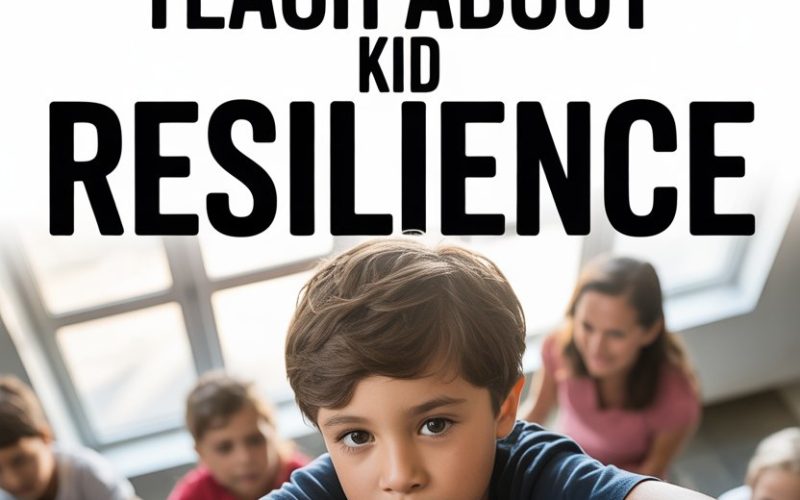If you’ve ever tried getting a five-year-old to wear matching socks, you might already appreciate the grit of Navy SEALs. But it turns out there’s a lot more than folded laundry that connects parenting and special ops.
SEAL training is famously brutal—think mud, ice-cold water, and sleep deprivation—but there’s a treasure trove of resilience strategies hiding beneath all that camo.
Techniques used to turn raw recruits into elite warriors can help shape children into more resilient, confident humans. Minus the push-ups, of course.
Here’s a few top-secret tricks for raising kids who can handle life’s curveballs.
Resilience Is a Muscle, and Yes, It Can Be Trained
SEAL instructors don’t look for superhumans—they look for people who show up, get knocked down, and get up again. Resilience is less about genetics and more about habits.
According to Dr. Angela Duckworth, author of Grit: The Power of Passion and Perseverance, it’s the daily grind that builds true stick-to-it-iveness.
Kids aren’t born knowing how to bounce back from disappointment. But they can absolutely learn how, with the right support.
Every time your child stumbles and tries again—be it tying shoelaces or tackling times tables—they’re flexing their resilience muscles. No chin-ups required.
Embrace the Suck (Or, Lean Into Challenges)
SEAL instructors have a phrase for tough situations: “embrace the suck.” It’s not about pretending everything’s fine when it isn’t. It’s about acknowledging discomfort and moving forward anyway.
For kids, that might mean seeing a spelling test go sideways, or being picked last for a team.
Instead of swooping in to soften the blow, try saying, “That was tough. How did you feel about it?” Pause. Listen. Then ask, “What do you want to do differently next time?”
Stanford psychologist Dr. Carol Dweck suggests praising effort, not just outcomes. When kids know that tough moments aren’t permanent, and that effort is valued, they become less afraid of setbacks.
Micro-Goals: The SEALs’ Secret Weapon
BUD/S (Basic Underwater Demolition/SEAL training) is famous for its sheer impossibility. Candidates are wet, cold, hungry, and exhausted for weeks on end.
The ones who survive? They break the ordeal into tiny, manageable pieces—sometimes just “making it to breakfast.”
Children can do the same. If your child is overwhelmed by a big project, help them chop it into micro-goals. “Let’s write the title today.” Or, “Can you read three pages before dinner?”
Each small win boosts confidence, much like those incremental benchmarks that keep SEAL candidates in the fight.
Self-Talk That Doesn’t Sound Like Cheesy Motivational Posters
The internal voice matters. SEALs are trained to monitor and reframe negative self-talk. Instead of “I’ll never get through this,” it’s “One more step.”
With kids, try modeling this aloud: “I’m having a hard time with this, but I can figure it out.” Invite them to notice their own ‘grumble voice.’
If your child says, “I can’t do math,” reply, “You can’t do it yet. What’s one part we can solve together?”
A 2019 study in the Journal of Adolescence found that positive self-talk improves children’s emotional regulation—especially during stressful moments.
The Magic of Routine (SEALs Call It ‘Standard Operating Procedure’)
You won’t find many SEALs ad-libbing their way through a mission. Routines reduce uncertainty and free up mental energy.
Structure at home works wonders, especially during rocky periods.
Think: the same bedtime ritual, a predictable after-school snack, or a quick “how was your day?” check-in. These routines provide an anchor when the world feels unpredictable.
Not all routines have to be rigid. Even something as simple as always reading together after tea can provide a sense of stability that lets kids weather bigger storms.
Controlled Exposure to Stress Makes Kids Stronger
SEAL training is basically a graduated exposure to discomfort. The principle is ancient—small, safe doses of adversity help the body and mind adapt, building what psychologists call “stress inoculation”.
For children, this doesn’t mean signing them up for a polar bear swim. It could be encouraging a shy child to say hello to a new classmate or inviting them to try a new food.
Each little encounter with unfamiliarity, handled with warmth and encouragement, helps kids learn that scary things can be survived—even mastered.
And when they wobble, all the better: it’s the recovery, not the avoidance, that builds resilience.
Failure Isn’t Fatal—It’s the Gateway to Growth
SEALs fail. A lot. In fact, the whole process is designed to weed out those who can’t cope with mistakes. What matters is how quickly you get back up.
Allow your child room to flub. If your young artist’s masterpiece looks more like a Picasso than a puppy, ask what they enjoyed about making it.
If the spelling list comes home full of red marks, focus on what’s next: “Which word do you want to practice together?”
Over time, mistakes become less scary. Some parents call this “failing forward”—a phrase that sounds almost cool enough for a T-shirt.
Teamwork: No Kid Is an Island
SEALs live by the mantra “no one left behind.” Collaboration isn’t just a military thing—it’s how we’re wired as humans.
Encourage your child to work with others, whether it’s sharing out the last biscuit, building a Lego spaceship with a sibling, or pitching in during a classroom clean-up.
Group projects can be a pain, but they teach vital skills: patience, negotiation, and the art of not always getting your own way.
And when tempers flare—as they inevitably do—help your child reflect: “How did your team solve that?” or “What could you try next time?”
Mindfulness: The Calm Inside the Chaos
SEALs practice “box breathing” to steady their nerves—four counts in, hold for four, four counts out, hold for four. It’s not just for the battlefield; plenty of teachers now use this simple trick in classrooms.
Teaching children even a basic version of mindful breathing helps them find calm when emotions run high. Some schools now use mindfulness programs to promote focus and resilience.
Try it before a big test, or after a playground squabble. Your child might roll their eyes—at first. But kids are sponges for these tools, and you might find yourself borrowing them the next time your day goes sideways.
Celebrating Progress—Even When It’s Tiny
SEAL instructors shout “good job!” when they see progress, not perfection. This isn’t just morale-boosting; it builds motivation and a sense of pride.
At home, celebrate the small stuff. Tie shoes on the first try? High five. Said “sorry” after a row with a mate? That’s worth some applause.
Every small victory teaches your child that effort matters and that progress—however incremental—is something to be proud of.
Keep Calm and Parent On
No one expects you to run your home like a covert operations unit. But parents can borrow a surprising amount from the playbook of the Navy SEALs.
Building resilience isn’t about forging mini-commandos; it’s about helping kids learn to recover, adapt, and try again. Some days, just making it through tea without a meltdown is victory enough.
Each time your child stumbles and gets up, celebrates a tiny win, or finds courage in a tough moment, they’re building the kind of resilience that lasts a lifetime.
And if you find yourself muttering motivational slogans while cleaning up spilled juice, well, you’re in good company.




